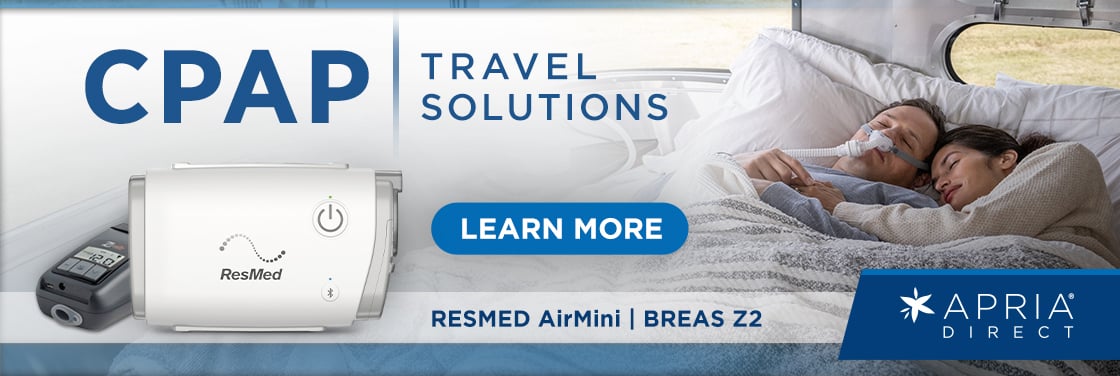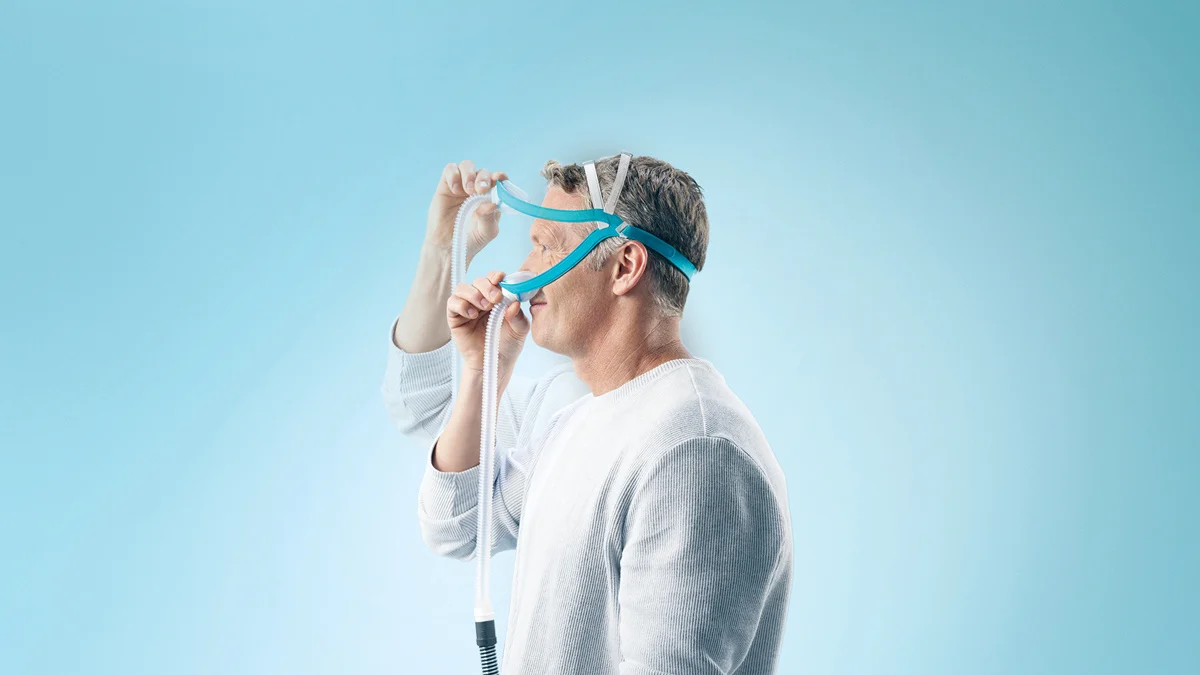Here’s How to Deal with the Risks of Cardiovascular Disease When You Have Sleep Apnea.
People with sleep apnea and their loved ones know the symptoms well: chronic snoring, gasping for air while sleeping, night sweats and morning headaches—and, of course, difficulty falling and staying asleep.
According to the American Medical Association, about 30 million Americans have sleep apnea, a chronic condition where your breathing stops or is interrupted during sleep. The result: reduced flow of oxygen to vital organs, which can lead to serious health consequences.
One of those is cardiovascular disease (CVD), which includes numerous, potentially critical problems relating to your heart and blood vessels (your cardiovascular system).
If untreated, sleep apnea can make CVD worse, which can then worsen sleep apnea.
Says Robert Miller, Apria Healthcare Vice President of Sleep Business, “It is important to understand the connection between sleep apnea and CVD—and how you can effectively treat both.”
Heart Conditions Caused By Sleep Apnea
High blood pressure (hypertension): It’s estimated that about 30% of people with high blood pressure have sleep apnea. And 50% of people with sleep apnea also have hypertension.
Atrial fibrillation (also called AFib, an irregular heartbeat): People with sleep apnea are up to four times more likely to have AFib than those who don’t. People with sleep apnea are also more likely to have bradycardia (slow heart rate).
Coronary artery disease (CAD): The small blood vessels that deliver blood and oxygen to your heart become narrow, causing heart damage. Sleep apnea increases the likelihood of CAD by 30%.
Congestive heart failure: Sleep apnea increases the risk of heart failure by 140%. Sleep apnea may also cause left ventricular diastolic dysfunction, where the left heart ventricle becomes stiffer, weakening the heart and leading to heart failure.
Heart attack and stroke: Studies suggest that sleep apnea increases the risk of plaque buildup in your arteries, resulting in a heart attack or stroke.
Additional risk factors: Sleep apnea can also contribute to other CVD risk factors, such as obesity, diabetes, stress, inflammation, and depression.
How Sleep Apnea Causes Heart Disease
Sleep is crucial to heart health—and your health overall. Without sleep, you are more at risk for heart problems. Here’s how sleep apnea impacts your heart health.
Increases your heart rate and blood pressure
When you sleep, your heart rate and blood pressure decrease, allowing your body to rest, recuperate, and rejuvenate.
But if your sleep is interrupted by sleep apnea, your blood pressure increases throughout the night. High blood pressure is a major risk factor for heart disease.
Reduces your blood oxygen levels
Frequent pauses in your breathing—sometimes called “stop-and-start” breathing—can decrease your blood oxygen levels. This may damage the blood vessels that deliver oxygen to your heart. It may also make your blood pressure spike and your heart beat faster, which can enlarge your heart. An enlarged heart doesn’t deliver oxygen efficiently.
Activates the sympathetic nervous system
This system kicks in when you are in dangerous or stressful situations. It speeds up your heart rate and increases your blood pressure—and may trigger you to gasp for air, waking you from a sound sleep.
Causes oxidative stress
“Stop-and-start” breathing causes changes in your blood oxygen levels, which places significant stress on your body. This is called oxidative stress, which promotes inflammation throughout your body and contributes to plaque buildup in the arteries of your heart, increasing the risk of heart disease.
Alters the amount of pressure in your chest
Sleep apnea causes you to have difficulty breathing and even stop breathing during sleep due to narrowed or closed airways. This can change the pressure in your chest cavity and, over time, damage your heart.
The Proven Therapy: CPAP
CPAP (continuous positive airway pressure) is considered the “gold standard” of sleep apnea care. It involves wearing a mask over your nose or mouth as you sleep. The mask is connected to a machine that delivers a constant flow of air at one pressure setting to keep airways open. So you can breathe—and sleep—normally.
Bilevel positive airway pressure (also known as BiPAP) is an alternative to CPAP. BiPAP delivers air at two alternating levels: a higher pressure for when you inhale and a lower pressure for when you exhale. Because BiPAP is more like natural breathing, many people with sleep apnea find it more comfortable than CPAP.
Numerous studies have demonstrated the effectiveness of CPAP and BiPAP for both sleep apnea and cardiovascular disease:
- Lowers heart disease risk and prevents cardiovascular complications of sleep apnea
- People with sleep apnea who use CPAP therapy had a 36% lower chance of dying from CVD and an 18% decreased risk of being hospitalized with CVD
- Decreases stress on your heart, helps control irregular heartbeat, and lowers blood pressure
- Helps reduce plaque buildup in the arteries and lessens inflammation of your aorta, the main artery that supplies oxygen to your body
Take Heart with CPAP!
Apria’s Robert Miller concludes, “You can effectively manage your sleep apnea—and reduce your risk of CVD—by using your CPAP machine every night as directed by your doctor.”
References
1. Berg, S. (2022, April 1). What doctors wish patients knew about sleep apnea. American Medical Association. https://www.ama-assn.org/delivering-care/public-health/what-doctors-wish-patients-knew-about-sleep-apnea.
2. Weingarten, J., Chowdhuri, M-A. (Updated 2019, March). Obstructive Sleep Apnea and Heart Disease. American Thoracic Society. https://www.thoracic.org/patients/patient-resources/resources/obstructive-sleep-apnea-and-heart.pdf.
3. Sleep Apnea and Heart Health. American Heart Association. https://www.heart.org/en/health-topics/sleep-disorders/sleep-apnea-and-heart-disease-stroke#.
4. Sleep disorders affect cardiovascular health. American Heart Association. https://www.heart.org/-/media/Files/Health-Topics/Sleep-Disorders/Sleep-Disorders-Fact-Sheet.pdf.
5. Newsom, R. (Updated 2023, June 15). Sleep Apnea and Heart Disease. Sleep Foundation. https://www.sleepfoundation.org/sleep-apnea/sleep-apnea-linked-heart-disease.
6. Yetman, D. (2022, August 4). Sleep Apnea and Coronary Artery Disease: What’s the Connection? Healthline. https://www.healthline.com/health/sleep-apnea-and-coronary-artery-disease.
7. Pelc, C. (2023, September 12). Using a CPAP may lower mortality risk from sleep apnea-related heart disease. Medical News Today. https://www.medicalnewstoday.com/articles/obstructive-sleep-apnea-cpap-helps-lower-cardiovascular-disease-mortality-risk#Using-CPAP-helps-reduce-arterial-plaque.
LEGAL DISCLAIMER: Material in this newsletter is provided for general health education and informational purposes and to provide references to other resources only; it may not apply to you as an individual. While Apria Healthcare believes that the information provided through this communication is accurate and reliable, Apria Healthcare cannot and does not make any such guarantee. It is not intended to be a replacement for professional medical advice, evaluation, diagnosis, services or treatment (collectively, “medical treatment”). Please see your healthcare provider for medical treatment related to you and your specific health condition(s). Never disregard medical advice or delay seeking medical care because of something you have read on or accessed through this website. Reading this newsletter should not be construed to mean that you have a healthcare provider/patient relationship.


.png)



